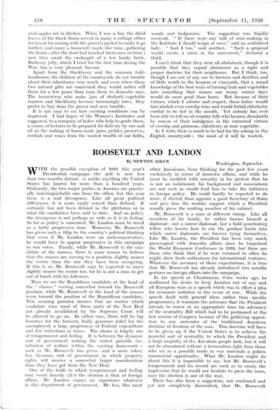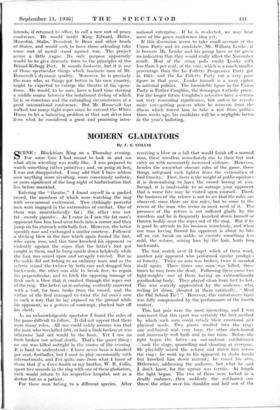ROOSEVELT AND LANDON
By NEWTON AIKEN
WITH the possible exception of 1916 this year's Presidential campaign—the poll is now less than two months distant—is unlike anything the United States has known for more than a hundred years. Ordinarily, the two major parties in America are practic- ally indistinguishable one from the other, but this year there is a real divergence. Like all great political differences, it is more easily sensed than defined. If certainly has not been defined in the platforms or in what the candidates have said to date. And on policy, the divergence is not perhaps as wide as it is in feeling. So far as policy is concerned, Mr. Landon must be rated as a fairly progressive man. Moreover, Mr. Roosevelt has given such a fillip to -the country's political thinking that even if Mr. Landon were an arch-conservative,' he would have to appear progressive in this campaign to win votes. Finally, while Mr. Roosevelt is the can-' didate of the masses, there is some reason to believe that the masses are moving to a position slightly nearer the centre than the one they have been occupying. If this is so, Mr. Roosevelt may be expected to move slightly nearer the centre too, for he is not a man to get out of touch with his followers.
Thus we see the Republican candidate at the head of the " classes " veering somewhat toward the Roosevelt position, while Mr. Roosevelt at the head of the masses veers toward the position of the Republican candidate. This seeming paradox insures that no matter which candidate wins most of those parts of the New Deal not already invalidated by the Supreme Court will be allowed to go on. In either case, there will be big bounties for the farmers, fairly generous relief for the unemployed, a• large programme of Federal expenditure and few reductions in taxes. The choice is largely one of temperament and feeling. It is between the dynamic sort of government seeking the widest possible dis- • tribution of welfare within the existing framework— such as Mr. Roosevelt has given—and a- more sober, less- dynamic, sort of government in which properly rights will receive a somewhat larger consideration than they have got from the New Deal.
One of the fields in which temperament and - feeling may count- heavily Eft'r the election is that' of foreign affairs. Mr. Landon enjoys no experience'-.whatever in this • department of government. 'He has, like' most Washington, September. other Americans, been thinking for the past few years excluSively in terms of domestic affairs, and while he must be credited with sincerity in his protest that he is not an isolationist, his background and associations are not such as would lead him to take the initiative in foreign policy. He could hardly be expected to do more, if elected, than appoint 'a good Secretary of State and give him the routine support which a President usually gives the ranking member of his cabinet.
Mr. Roosevelt is a man of different stamp. Like all members of his family, he rather fancies himself a diplomat—not a career diplomat, but a • bold penetrating fellow who knows how to cut the gordian knots into which career diplomats are forever tying themselves.
Like Mr. Landon, the President has been very much, preoccupied with domestic affairs since he .torpedoed the World Economic Conference in 1933, but there are those who think that if he were returned to office he might show fresh enthusiasm for international ventures. Whatever the accuracy of these expectations, it is true that Mr. Roosevelt has already introduced two notable gestures on foreign affairs into the campaign.
In his speech at Chautauqua, tl ree weeks ago, he reaffirmed his desire to keep America out of any and all European wars in a speech which was in effect a plea; for economic isolation in the event of war. While the, speech dealt with general ideas rather than specific programmes, it warrants the inference that the President intends to renew at an appropriate time his advocacy , of the neutrality Bill which had to, be postponed at the last session of Congress because of' the gathering opposi- tion to any surrender of the traditional American doctrine of freedom of the seas. This doctrine will `have to be given up if the United States is to achieve the peaceful sort of neutrality to which the President and a large majority of the American people look, but it will not be abandoned without 'a tremendous fight from those who see in a possible trade in war materials a golden- commercial opportunity. What Mr. Landon might do, about this it is impossible to say, but Mr. Roosevelt's temperament and his record are such as to create the impression that he would not hesitate to press the issue, once the election is out of the way.
There has also been a suggestion, not confirmed and yet -'ribt completely discredited, that Mr. Roosevelt intends, if returned to office, to call a new sort of peace conference. He would invite King Edward, Hitler, Mussolini, Stalin, President le Brun and other heads of States, and would seek to have those attending take some sort of moral stand against war. The project seems a little vague. Its only purpose apparently would be to give dramatic form to the principles of the Briand-Kellogg Pact. It sounds fantastic, but it is one of those spectacular things which fascinate men of Mr. Roosevelt's dynamic quality. Moreover, he is precisely the man who, as things got better in his own country, might be expected to enlarge the theatre of his opera- tions. He would, to be sure, have a hard time steering a.middle course between the isolationist feeling of which he is so conscious and the entangling circumstances of a great international conference. But Mr. Roosevelt has walked too many tight-ropes since he entered the White House to let a balancing problem of that sort deter him from what he considered a great and promising inter- national enterprise. If he is re-elected, we may hear more of the peace conference idea yet.
If this discussion seems to take small account of t he Union Party and its candidate, Mr. William Lemke, it is because Mr. Lemke and his group have so far given no indication that they would really affect the November result. Most of the straw polls credit Lemke with less than 5 per cent. of the vote, which is a much smaller percentage than the La Follette Progressive Party got in 1924—and the La Follette Party cut a very poor figure in that year. Lemke himself is a mere cipher in national politics. The formidable figure in the Union Party is Father Coughlin, the demagogic Catholic priest. For the longer future Coughlin's activities have a certain not very reassuring significance, but unless he reveals more vote-getting powers when he recovers from the illness which forced him to . take a rest from politics three weeks ago, his candidate will be a negligible factor in the year's balloting.













































 Previous page
Previous page